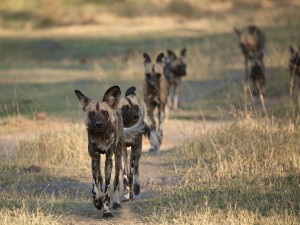Dogs Will Be Dogs
By Amy Fernandez
 Possibly, the best thing about dogs is their baffling combination of predictability and weirdness. As much as they love their strict routines, every now and then, for unexplainable reasons, they simply decide to change it up. This behavior is not so great when this happens in the show ring, but there you go.
Possibly, the best thing about dogs is their baffling combination of predictability and weirdness. As much as they love their strict routines, every now and then, for unexplainable reasons, they simply decide to change it up. This behavior is not so great when this happens in the show ring, but there you go.
If it’s any consolation, this nonsense is not limited to show dogs or domestic dogs. Recently, ecologists from Montana State University collaborated with researchers from the Zambian Carnivore Program to track the activities of three African wild dogs. This fascinating project was profiled in Science Times on June 21.
Sometimes called Cape Hunting Dogs, their appearance is unmistakably dog, with big antennae ears, long bushy tails, elegantly tapered muzzles and a slinky, rectangular shape built for trotting. Lycaon pictus split off from the canid family tree about six million years ago. Even then, they possessed the essential roster of canine strategies. In terms of African predators, they are shrimps, topping out around 50 pounds, but they are lethal hunters as this Times story explained. “Wild Dogs have a genius for avoiding trouble–a legacy, Dr. Creel believes, of their evolutionary past. The major meat eaters of Africa compete with one another for large prey, and theft is often part of the strategy. Wild dogs are among the most proficient hunters in the mammal heirarchy, capturing their prey roughly half the time; a lion’s kill rate is only 25 percent.” Keep in mind that both species shop at the same store and lions have about a 400-pound advantage. That’s canine craftiness at its finest. “African wild dogs are inescapably social animals. They evolved for life in a pack. Only through disciplined teamwork and relentless, balletic athleticism can the 50-pound dogs pull down a 300-pound antelope.”
Like canines everywhere, they are wired to be social. Therefore, three young females suddenly striking off from their pack is very strange indeed. And this study documented just how far they will go to find and maintain a social niche. This trio of sisters was tracked as they left their ancestral pack in search of new mates and new territory. That turned into more than 1300 miles of opportunistic meandering. Tracked via GPS collars, their movements were random and baffling for most of the trip, thus confirming that we really don’t know what’s going on in canine brains.
The article emphasized the inherent risks of their trek, which ran the gamut from a 300-foot swim across the crocodile-infested Luangwa River to dodging trucks on a four lane highway.
Researchers were simultaneously puzzled and shocked by the bizarre choices of these wandering sisters. Even after witnessing their incredible decision to swim with the crocs, they were stunned to see them race across the four lane death trap connecting the Zambian capital with Lilongwe, the capital of Malawi. Apparently, their survival skills have been adapted to negotiate around human dangers just as well as their domesticated counterparts. They sailed through highly populated towns and villages unseen, all the while keeping together and scanning for new opportunities.
At one point, they went silent for weeks. The research team panicked. Were they sick, injured or dead? No, they were just taking some normal lazy dog downtime. Eventually, ten months after they started this odyssey, they have settled within the safety of Lower Zambezi National Park, where the team suspects they are planning to poach some young males from the park’s existing pack to start their own. And that makes perfect canine sense.
Short URL: https://caninechronicle.com/?p=254422
Comments are closed












